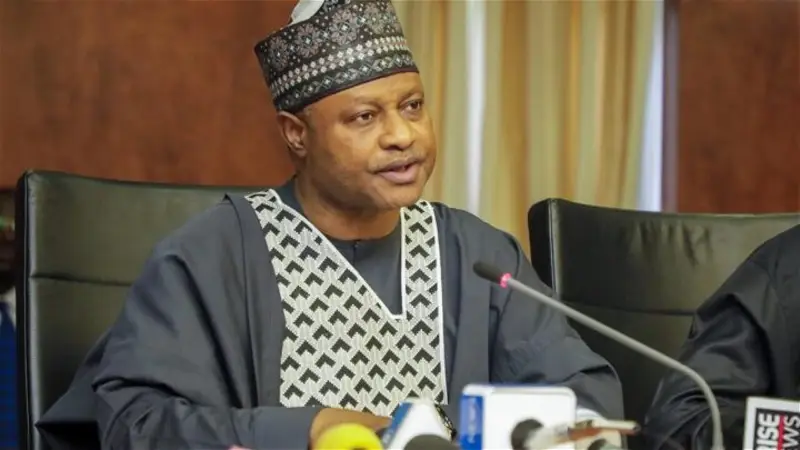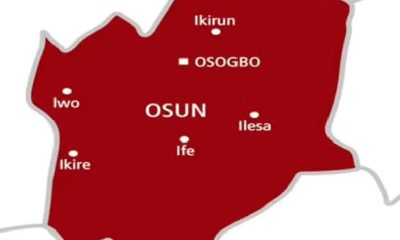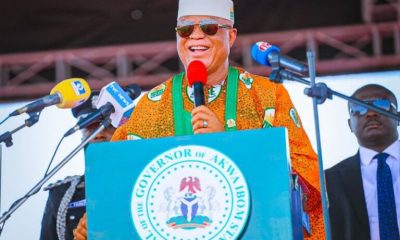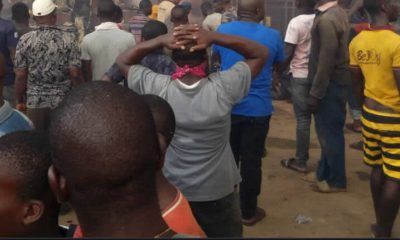News
Breaking: Supreme Court Affirms Sani As Kaduna Governor

Respite came the way of Governor Uba Sani of Kaduna State on Friday, as the Supreme Court affirmed his election victory.
A five-member panel of the apex court, in a unanimous decision, held that there was no merit in an appeal that the Peoples Democratic Party, PDP, and its candidate, Mohammed Ashiru, filed to challenge the outcome of the governorship election that was held in the state on March 18, 2023.
In the lead judgement that was delivered by Justice Tijjani Abubakar, the apex court held that the petition the PDP and its candidate filed to challenge Governor Sani’s election was incompetent.
It held that since the originating petition was incompetent, no relief could be granted to the appellants in the matter.
Consequently, the apex court upheld the earlier judgement of the Court of Appeal, which dismissed the case for being devoid of merit.
“The appeal is frivolous, vexatious, and irritating. It therefore deserves to be dismissed, and it is hereby dismissed,” Justice Abubakar held.
It will be recalled that the Independent National Electoral Commission, INEC, declared that Governor Sani, who was the candidate of the All Progressives Congress, APC, garnered a total of 730,001 votes to defeat the PDP candidate, Ashiru, who polled 719,196 votes.
However, dissatisfied with the result of the election, the PDP and its candidate approached the tribunal to challenge it.
The petitioners alleged that Governor Uba was not duly elected by a majority of valid votes cast in the election, adding that the election was invalid because of corrupt practices and noncompliance with provisions of the Electoral Act 2022.
They alleged that some polling unit results were wrongfully cancelled, insisting that there were inconsistencies in accreditation records from INEC.
Meanwhile, the tribunal, in a two-to-one split judgement it delivered on September 28, dismissed the petition on technical grounds and upheld Sani’s election victory.
The Justice Victor Oviawie-led tribunal, in its majority decision, said it deemed the petition abandoned, noting that the PDP and its candidate did not file their pre-hearing application within the time prescribed by the law.
Even though the tribunal dismissed the petition as abandoned, it, however, held that if it were to determine the case on its merit, it would have ordered INEC to conduct a supplementary election in 22 polling units in the state within 90 days.
More so, the tribunal, in its alternative decision, found merit in the case of the petitioners relating to the margin of victory between the two leading candidates.
It noted that the difference between votes that were credited to the APC and PDP candidates was about 10,806 votes, while the total number of votes in areas were results of the election were cancelled were about 16,423 votes.
It held that the results of supplementary election in the affected polling units was capable of substantially affecting the overall outcome of the governorship election.
In its judgement on November 24, 2023, the Abuja Division of the Court of Appeal affirmed Governor Sani’s election victory.
The court, in a unanimous decision by a three-member panel of justices, dismissed the appeal by the PDP and its candidate, Ashiru.
In its lead judgement that was delivered by Justice Obietonbara Daniel-Kalio, the court upheld the verdict of the tribunal.
It held that the tribunal was right in its majority decision when it declared the petition by the PDP and its candidate as abandoned.
According to the appellate court, records before it established that the petitioners acted in breach of Paragraph 18(1) of the First Schedule to the Electoral Act 2022 when they prematurely applied to the tribunal for the issuance of a pre-hearing notice.
Noting that the law provided that such an application must be filed seven days after the close of pleadings by the parties, the court waved aside the argument of the appellants that they acted “out of an abundance of caution.”
It held that vigilance in prosecuting a matter could not be equated with jumping the gun, adding that one of the essential elements for the exercise of jurisdiction by a court “is that a case must be initiated by due process of the law.”
Besides, the court maintained that statements on oath that were made by most of the witnesses who testified for the appellants were invalid as they were not filed alongside the petition.
It held that the failure to frontload the statements of the witnesses within the 21 days prescribed for filing the petition rendered them legally incompetent.
The appellate court held that most of the witnesses who testified for the petitioners gave hearsay evidence.
The court said it was satisfied that the tribunal properly evaluated the evidence that was adduced before it by the parties and accorded probative value to them.
It resolved all five issues that were raised in the appeal against the appellants.
While deciding a cross-appeal that was filed by Governor Sani, the appellate court voided the minority decision of the tribunal, which ordered INEC to conduct a fresh poll in 22 polling units within four Local Government Areas in the state.
The court held that the judge who gave the dissenting verdict relied on documents with discrepancies, as well as hearsay evidence from discredited witnesses, to declare the governorship election inconclusive.
-

 Opinion5 days ago
Opinion5 days agoThe Clout-chasing Dipo Awojide By Comrade Da’Peace
-

 News4 days ago
News4 days agoRamadan, Lent: Shettima Calls For National Unity And Compassion
-

 Opinion4 days ago
Opinion4 days agoReinventing Osun’s Economy Through Dagbolu Intl. Trade Centre: From Quiet Market Lessons To Regional Trade Revolution By Adeboye Adebayo
-

 News4 days ago
News4 days ago‘Wike Factor’: Another PDP Chairmanship Candidate Steps Down For APC In FCT














